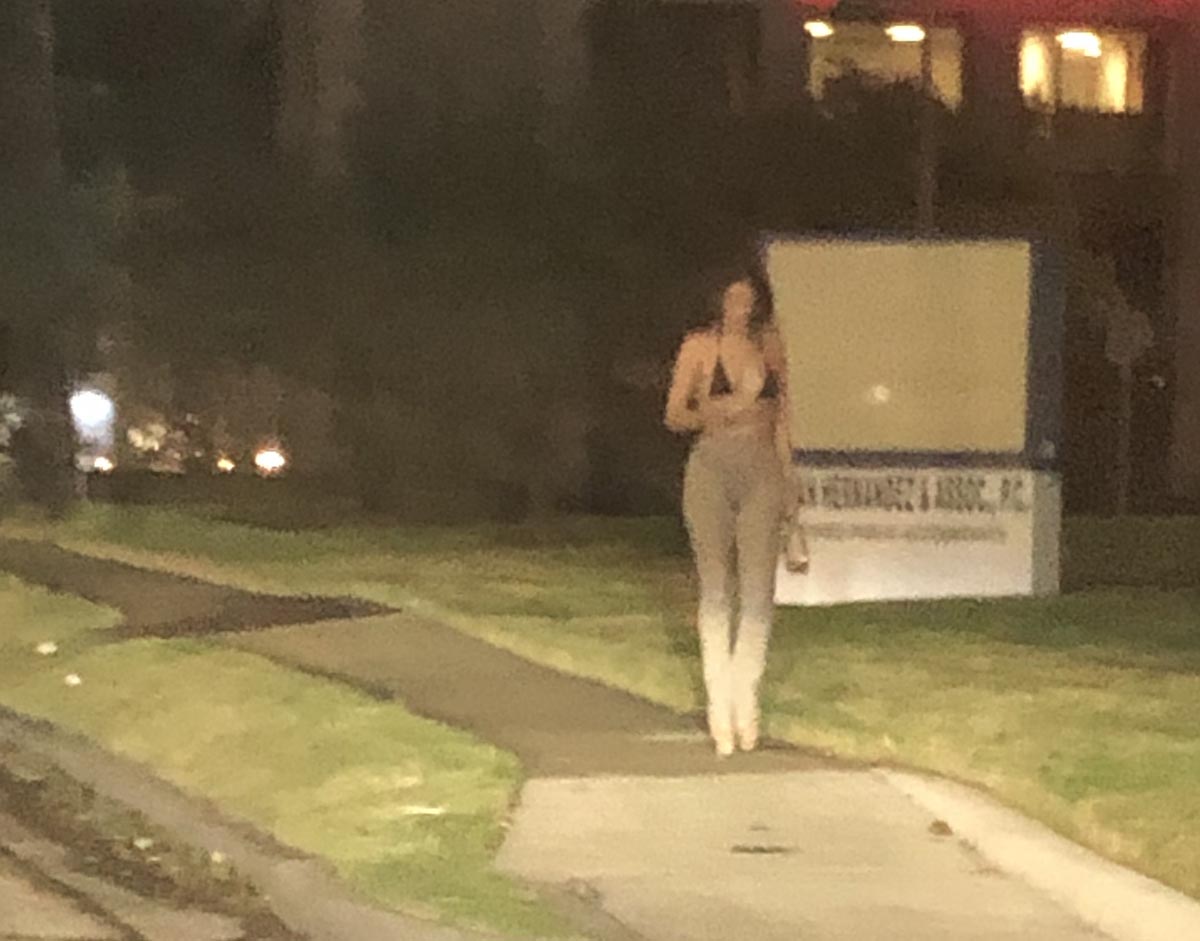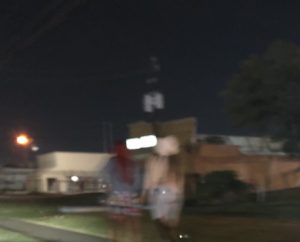Saving Grace
One Family’s Fight to Save Their Daughter From Human Trafficking

Intown Report on Human Trafficking Part II
Grace grew up in Katy, TX, a once quiet little suburb on Houston’s westside, that attracts new families from all over the country with their many district awards and achievements. Despite the opulence of suburban districts like Katy ISD, trafficking is increasing in suburban areas across the country. Grace’s story starts like so many young girls but took a very dark turn when she turned 18. This story begins with Grace as she made her second attempt to leave the life of Human Sex Trafficking after being trafficked for one year. How it all started, what hurt her the most, and what contributed to her choices. The broken system from the top down has failed Grace, and her family, who are working tirelessly to save her life. This story is about the devastation of being pulled back into the hell that is “the life” and powerless to break the psychological grip that her traffickers had on her. Her story should inspire the community and lawmakers to step up and fight to change the broken system that is stealing the lives of so many of our children.
Grace’s life was pretty standard until she turned 12. That was the age that everything in her world would change. At 11, Grace was a student-athlete, attended church with her family, and was an honor roll student. She was tall and pretty with dark blonde hair and beautiful blue eyes, so she did what most girls her age do (what all of her friends were doing) and tried out for cheerleading. That year Grace didn’t make the squad but her best friends did. These weren’t just any friends, they had been in girl scouts and YMCA volleyball with her since kindergarten. She was disappointed that she didn’t make it, but she and her friends still had volleyball, which was enough for her. On her 12th birthday, Grace invited all of her best friends (now cheerleaders) to her small birthday party at the neighborhood park. She had a cake, balloons, and plans to hang out and play volleyball (because that is what they all still had in common). That day is the day that Grace describes as the worst day of her life, which is pretty powerful given what she has been through. Someone left Grace left sitting at the park waiting for her “friends” who all said they would come. What she didn’t know is that her friends, as a group decision, leaving her waiting for them, sobbing at the park, at her birthday party, would send the message that she wasn’t good enough for them anymore because she wasn’t “one of them anymore.” Grace was devastated, and when she returned to school the following Monday, the bullying only got worse. Grace told me that story with tears in her eyes and said, “that’s the moment I decided,I would never trust anyone who says they are my friend”. She shut down emotionally, craving acceptance but never trusting that it would be genuine. Through junior high and high school Grace continued to play sports, continued to attend church, but emotionally she continued to carry the hurt that her friends had caused her that day of her 12th birthday and the years of bullying that followed.
 In high school, Grace struggled with the inability to feel confident enough to make friends. She struggled with her self esteem and was suffering from depression, and even had thoughts of suicide. That is also when she started hanging out with a couple of kids similarly situated from a social aspect. They were smoking pot and drinking, so she tried it too, and discovered not only how easy it was to get but also the escape it provided her from the pain of the bullying and torment that she had suffered at the hands of her once best friends. Drugs and alcohol were her escape, and they allowed her to be someone else. In her own words, she felt like for once; she could be free. During her senior year (now 17 almost 18 years old), she did not want to go to school; she just wanted to be done, so her parents (not wanting her to drop out) compromised and allowed her to participate in a smaller “high school” in the district. It offered an accelerated program to help kids finish school at their own pace, and for most, much faster. The problem was that this small campus connects to the district’s Juvenile Justice Alternative Education Program (JJAEP). The JJAEP campus consists of some of the most troubled youth in the community who have committed serious offenses that allowed the district to deem them unsafe to be present at their home campus. While attending her accelerated program, she was around JJAEP students (imagine being at a restaurant when a bus full of prisoners comes to eat). On the shared school bus with one of the JJAEP students, she is invited to hang out and smoke weed.
In high school, Grace struggled with the inability to feel confident enough to make friends. She struggled with her self esteem and was suffering from depression, and even had thoughts of suicide. That is also when she started hanging out with a couple of kids similarly situated from a social aspect. They were smoking pot and drinking, so she tried it too, and discovered not only how easy it was to get but also the escape it provided her from the pain of the bullying and torment that she had suffered at the hands of her once best friends. Drugs and alcohol were her escape, and they allowed her to be someone else. In her own words, she felt like for once; she could be free. During her senior year (now 17 almost 18 years old), she did not want to go to school; she just wanted to be done, so her parents (not wanting her to drop out) compromised and allowed her to participate in a smaller “high school” in the district. It offered an accelerated program to help kids finish school at their own pace, and for most, much faster. The problem was that this small campus connects to the district’s Juvenile Justice Alternative Education Program (JJAEP). The JJAEP campus consists of some of the most troubled youth in the community who have committed serious offenses that allowed the district to deem them unsafe to be present at their home campus. While attending her accelerated program, she was around JJAEP students (imagine being at a restaurant when a bus full of prisoners comes to eat). On the shared school bus with one of the JJAEP students, she is invited to hang out and smoke weed.
For the first time since junior high, Grace felt like maybe she could fit in and possibly even have friends who didn’t think she wasn’t good enough. While hanging out with these new kids, under the influence of marijuana, they asked her to try meth for the first time. They convinced her that it was fun and would make her forget all of her problems. She didn’t want to disappoint or lose her new friends, so she tried it, and she liked it. Over the next several weeks, she started pulling away from her family. Although she continued to go to school and work, she was rapidly spiraling out of control. She spent more and more time with her new friends using drugs and falling further and further into addiction. Soon after, she turned 18 and decided she didn’t want to go home anymore because her parents were “too strict and didn’t want her to use drugs and alcohol”. Grace temporarily stayed with a friend and his mom, but that was short-lived because of her addiction. She continued to finish school and her parents were trying to work with her, keep her as close as they could, and keep an eye on her. The police had already told them that because she was 18, she could leave if she wanted to.
One morning in September, Grace was found sleeping outside her high school by one of her counselors. The counselor consulted with a second counselor and decided to take her into Houston to a homeless shelter near Montrose, which Grace knew nothing about. This shelter was for homeless teens, and every night there is a lottery drawing for beds. If you draw a bed, you get to sleep inside, and if you don’t, you have to figure it out on the street. It was on a night Grace was sleeping in the cold at a gas station, with nothing but a borrowed hoodie for warmth, when she is approached by a man twice her age. He offers to let her sleep in his hotel room, and out of the cold. This man would become her “boyfriend” and her first pimp. Grace was an 18-year-old high school senior, who had developed a drug habit, was insecure, and vulnerable. She was the perfect target.
Grace would spend an entire year being trafficked all over Houston, Dallas, Austin, the midwest and the east coast. During that year, Grace filed charges against one of her traffickers. She walked right into a police station and asked for help. They took her report and gave her a cell phone to reach her, the DA accepted the charges, and to date, no arrest has been made, although her trafficker is currently out on bond on a separate trafficking charge. No one offered her services or a way out. Grace went to the hospital numerous times with abdominal pain from damage done to her insides from the months of violent sexual encounters. Each hospital worker knew she was a victim of human trafficking, but instead of getting her services, they handed her a pamphlet. When her parents tried to get mental health warrants, they were told they needed an exact address and time to serve the warrant, which was impossible because they lived out of hotels. They can’t have her involuntarily committed because the law does not recognize addiction or human trafficking as a credible “threat to oneself or others.” As it stands, a person has to express their desire to commit homicide or suicide to be committed. The system and the law have failed Grace at every turn.
 Grace was out of the life of human sex trafficking for 36 days. She spoke very candidly about the pimps who chased her down the street with guns in an attempt to capture her for their stable (the term used to describe a pimps group of girls), serial killers, and rapist that picked her up. This resulted in her jumping from a moving car out of fear that they would kill her. Also, to avoid the rapes, the men with odd fetishes, the abusive men who wanted to hit her, and the addictions fueled it all. Grace was the girl who didn’t need anything from anyone and knew how to take care of herself armed only with a pocket knife for protection. She talked about it all as if she was describing a movie and that it wasn’t her life. Then there was the other side of Grace that still cried when she talked about her 12th birthday party, the bullying, and the sadness over the relationship she had built with that trafficker who gave a teenage girl a warm place to stay on a cold night. As she described the friends she had made on the street with the other girls in the same situation she was in, it clicked. She felt accepted in a way that she hadn’t since she was 11 years old. She felt like no one was judging her, and no one would be disappointed in her because there were no expectations as long as she met her quota. She had formed a new group of “friends,” and just like the last ones, she didn’t see that they too would hurt her and that she was only with them because of geographic proximity, much like those girls from junior high.
Grace was out of the life of human sex trafficking for 36 days. She spoke very candidly about the pimps who chased her down the street with guns in an attempt to capture her for their stable (the term used to describe a pimps group of girls), serial killers, and rapist that picked her up. This resulted in her jumping from a moving car out of fear that they would kill her. Also, to avoid the rapes, the men with odd fetishes, the abusive men who wanted to hit her, and the addictions fueled it all. Grace was the girl who didn’t need anything from anyone and knew how to take care of herself armed only with a pocket knife for protection. She talked about it all as if she was describing a movie and that it wasn’t her life. Then there was the other side of Grace that still cried when she talked about her 12th birthday party, the bullying, and the sadness over the relationship she had built with that trafficker who gave a teenage girl a warm place to stay on a cold night. As she described the friends she had made on the street with the other girls in the same situation she was in, it clicked. She felt accepted in a way that she hadn’t since she was 11 years old. She felt like no one was judging her, and no one would be disappointed in her because there were no expectations as long as she met her quota. She had formed a new group of “friends,” and just like the last ones, she didn’t see that they too would hurt her and that she was only with them because of geographic proximity, much like those girls from junior high.
Grace also talked a lot about how much she missed her “boyfriend” (her first pimp), who she saw as some prince charming from a fairy tale, and who is currently on bond and has even done prison time for repeated convictions for domestic violence. Grace was showed these charges, the convictions, and the charging instruments, and momentarily she realized she was just another woman in the same situation with the same man. She described him being physically abusive toward her, hitting her and choking her until she passed out, but even with all of the realizations about who he indeed was, Grace still loved him. Domestic violence can feel like an addiction, and it’s a tough cycle to break. The best way to explain human sex trafficking is, it’s the place where domestic violence and sexual assault intersect.
Grace was showing so much promise, and for the first time since leaving her old life, she was optimistic and hopeful. She was finishing school online. She had met with her advocate and even started counseling services. Her advocate explained that she would help her get housing but that it takes a minimum of six months to a year, which seemed like forever in her now 19-year-old brain, but she was excited. She laid out a list of in-patient and out-patient services available to her and the process for utilizing said resources while she waited for housing. She had a plan to move forward with her life. Grace was starting over. She had the help of some donors who helped her get some clothes, have a little money, and she had a safe place to stay away from the life and everyone she had left behind, but it wasn’t far enough. Everything seemed so normal, and one morning she was gone again. No note, not a trace, she just left. Ten days later, her dad tracked her down at a motel room on the Northside of Houston near Spring, where she had reconnected with some girls that she was with before, her “friends.” Her dad forced her back home, and they were working to find a treatment facility, which is few and far between and require the victim to want to enter the program. When we talked, I asked her what happened and why she left. She said she wanted friends, was feeling restless and alone, and just wanted a place of her own where she would have freedom and independence. She didn’t admit being sucked back into her old life, or to the addiction that started it all, and the “friends” who trafficked her. Not long after that conversation, Grace was gone again. She is back to where it all started, in danger every time she gets into a car with a stranger, controlled by traffickers and drugs, and her parents are powerless to help her. At every turn, someone in her path with the ability to help her had the current legal system or resources available to victims was adequate. Could the school counselors who took Grace to the homeless shelter have avoided putting her on the collision course if they had more training and understanding of addiction, homelessness, and trafficking? Maybe the nurses who encountered her at the hospital with only a pamphlet to give her could do more with the right services to offer. The police officer who took her report could have done more if he had more services to offer. It leads us back to the elected officials, prosecutors, and judges’ duties to keep traffickers off the street.
Read Part 1 of the Intown Report on Human Traficking HERE
JAMIE WINSTON























